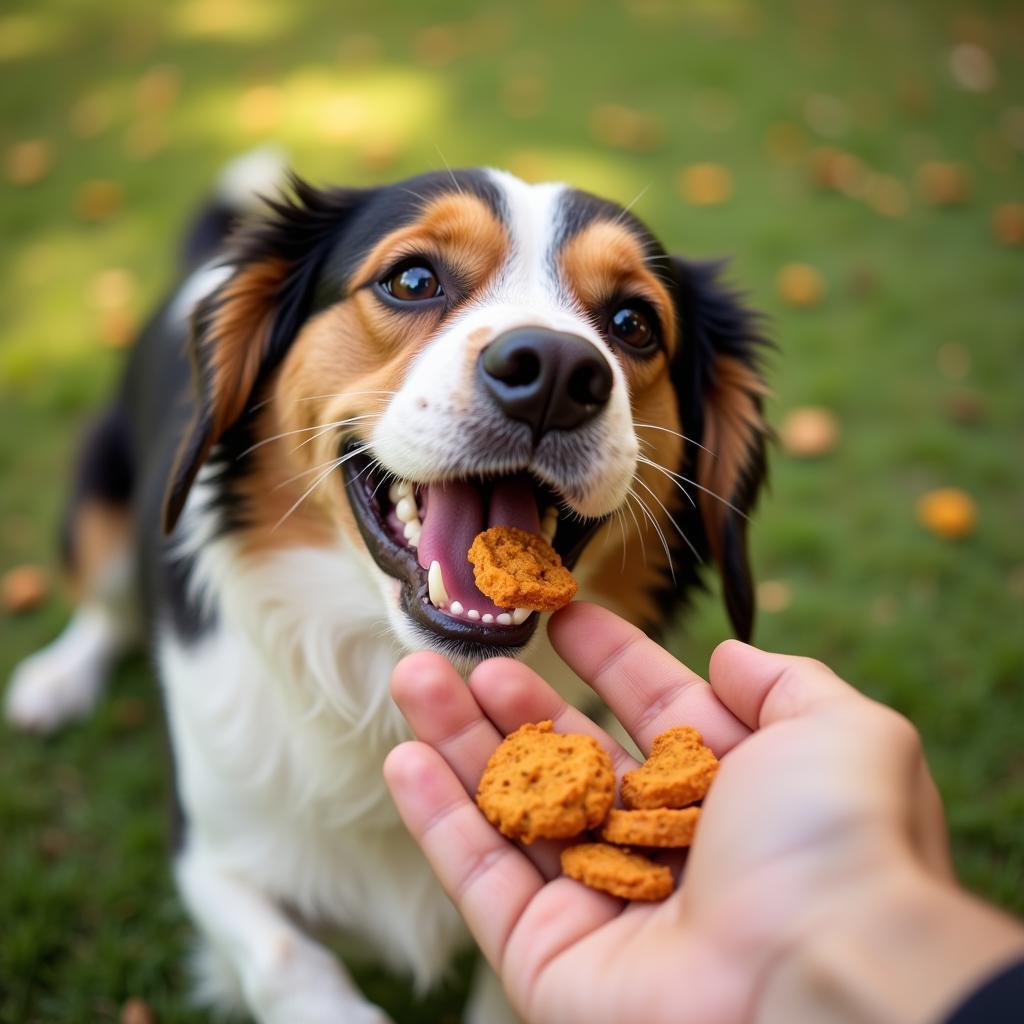You fill their bowl with the usual kibble, hoping for a satisfying crunch, but instead, you’re met with a resounding sniff and a walk away. Your dog, who usually inhales their food, is turning their nose up at dinner. Yet, offer a tasty treat, and they’re gobbling it down in seconds. This frustrating scenario has many pet parents wondering, “Why is my Dog Not Eating Food But Will Eat Treats?”
Let’s dive into the possible reasons behind this picky eating behavior and explore ways to get your furry friend back on track with their regular meals.
Is Your Dog Really a Picky Eater? Understanding the Behavior
Before we jump to conclusions, it’s crucial to differentiate between a dog who’s a truly picky eater and one whose behavior signals an underlying issue. While some dogs are naturally more selective with their food, a sudden change in appetite, especially when accompanied by other symptoms like vomiting, diarrhea, or lethargy, warrants a trip to the vet.
Here are some reasons your dog might be snubbing their regular food:
Medical Reasons Your Dog Might Not Be Eating
Several health conditions can cause a decreased appetite in dogs. While they might still be tempted by a delicious treat, addressing the underlying medical issue is crucial.
- Dental problems: A toothache, gum inflammation, or mouth sores can make chewing painful, leading your dog to avoid hard food.
- Gastrointestinal upset: Like humans, dogs can experience stomach bugs, constipation, or other digestive discomforts that make them lose their appetite.
- Other illnesses: Kidney disease, liver disease, infections, and even certain cancers can manifest as a loss of appetite in dogs.
If you suspect your dog’s refusal to eat stems from a medical issue, consult your veterinarian immediately.
Behavioral Reasons for Your Dog’s Picky Eating
If your vet has ruled out medical concerns, your dog’s eating habits could be attributed to behavioral reasons.
- Treat Overload: If you’re constantly showering your dog with treats, they might start holding out for those tastier morsels, viewing their regular food as less appealing.
- Too Many Options: Imagine being offered a buffet every night—it’s overwhelming! Offering your dog various food options can lead to pickiness as they learn to hold out for their favorite.
- Food Boredom: Just like us, dogs can get bored with the same food day after day.
 Dog Eating Treats Happily
Dog Eating Treats Happily
How to Encourage Your Dog to Eat Their Food
The good news is that you can encourage your dog to rediscover the joy of mealtime. Here are some tips:
- Establish a Routine: Feed your dog at the same time every day and stick to a consistent feeding schedule.
- Limit Treats: Cut back on treats and use them strategically as rewards during training sessions.
- Make Mealtime Appealing: Try warming up their food or adding a spoonful of low-sodium broth to enhance the aroma and flavor.
- Switch to a Different Food: Your dog might simply prefer a different flavor profile. Consider switching to a higher-quality food pellet or a different protein source.
- Don’t Give In: Avoid the temptation to offer treats or table scraps when your dog refuses their food. This reinforces picky eating habits.
When to Consult a Veterinarian
If your dog’s appetite doesn’t improve despite trying these tips or if you notice any other concerning symptoms, consult your veterinarian. They can help rule out any underlying medical conditions and provide further guidance.
FAQs
Q: How long can a dog go without eating?
A: While a healthy dog can typically go for a day or two without eating, it’s best to consult your veterinarian if your dog refuses food for more than 24 hours, especially if accompanied by other symptoms.
Q: Can I make my own dog food to entice my picky eater?
A: While preparing homemade meals can be an option, consult your veterinarian or a veterinary nutritionist to ensure the diet is nutritionally balanced for your dog’s needs. You can also find helpful recipes in a dog food cookbook.
Q: My dog only eats when I hand-feed them. Is this normal?
A: While some dogs enjoy the extra attention, hand-feeding should not become a habit. Try transitioning them back to eating from their bowl gradually.
Q: Can stress or anxiety affect a dog’s appetite?
A: Absolutely! Just like humans, dogs can experience loss of appetite due to stress, anxiety, or changes in their environment.
Still Have Questions?
Dealing with a picky eater can be frustrating, but remember, patience and consistency are key. For personalized advice or to explore further resources on dog nutrition and behavior, don’t hesitate to reach out. You can contact us at:
- Phone Number: 02437655121
- Email: minacones@gmail.com
- Address: 3PGH+8R9, ĐT70A, thôn Trung, Bắc Từ Liêm, Hà Nội, Việt Nam.
We’re here to support you and your furry friend on your culinary journey!